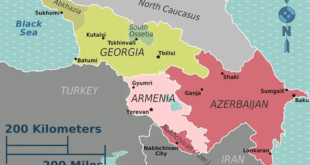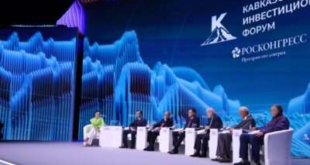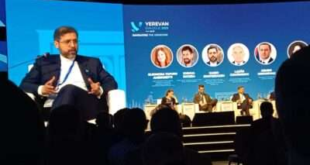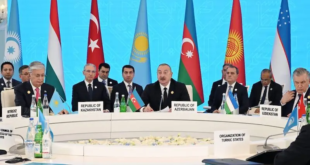 Viktor Yushchenko, the Ukrainian President, was in a fierce and defiant mood yesterday as he urged Nato to respond to the Russian invasion of Georgia by moving quickly to expand the frontiers of the alliance eastwards.
Viktor Yushchenko, the Ukrainian President, was in a fierce and defiant mood yesterday as he urged Nato to respond to the Russian invasion of Georgia by moving quickly to expand the frontiers of the alliance eastwards.
In an exclusive interview with The Times Mr Yushchenko asserted that the fundamentals of international politics had changed. Ukraine had to do everything in its power to ensure it was not going to be next on the Kremlin hitlist.
Â
“It is the first time in Europe since the Cold War that a foreign army has entered the territory of a sovereign state without any internationally accepted legal basis,” he said.
Â
“If we were to be ambivalent about this it would give tacit approval to put our country and our citizens under threat.”
Â
The President – one of the figureheads of the Orange Revolution that toppled Moscow’s favoured candidate for the leadership of Ukraine – was careful not to criticise Vladimir Putin, the Russian Prime Minister, directly.
Â
Even when the 54-year-old economist flew to Tbilisi shortly after the outbreak of the Russian-Georgian war, his words were more carefully chosen than those of the other East European heads of state.
Â
Russians form a strong minority in Ukraine – about 17 per cent of the population, in the east and to the south in the Crimea – and could become a flashpoint in any future confrontation with Moscow.
Â
Yesterday was the eve of Ukrainian Independence Day and it was time for the President to break cover. Over the roofs of Kiev, a Ukrainian jet fighter howled through the sky. It was preparing for the celebrations, but its presence still induced a vague sense of menace.
Â
This weekend the Independence Day festivities will have a martial edge. It is a good moment to display strength, although in truth the Ukrainian forces are a mere shadow of those of Russia, which is using oil money to modernise the army and boost military might. New aircraft carriers are planned, and new equipment across the board.
Â
“Ukraine has to move towards the Nato alliance,” the President said, drumming up support before the Nato summit in December.
Â
“It is the only way for our country to protect our national security and sovereignty. When the borders of Nato expand, so too does the region of peace and stability.”
Â
The defence budget of Ukraine – as in other nervous Central European states – is to be raised immediately. “I want to remind all political forces in our country that shout about the possible neutral status of Ukraine that neutrality can come at a very high price,” he said, casting a nod at pro-Moscow politicians.
Â
As a young man, the President had direct experience of Russia’s fear of encirclement – after graduation he did national service as a KGB border guard on the Soviet-Turkish border.
Â
“We need to increase the military budget so that there is no question about what happens tomorrow,” he added.
Â
Russia argues that the West is posing a direct threat on its borders by expanding Nato, but its invasion on behalf of the South Ossetians has cancelled out its claim to have legitimate anxieties.
Â
“The peace and security of Europe are under threat, thus a united Europe should give a robust and appropriate response,” the President said.
Â
Instead, at the beginning of a new Russian presidency, Moscow is demonstrating its readiness to champion Russian minorities everywhere – disturbing for Estonia with 30 per cent of its population of Russian origin; Latvia with 33 per cent; Moldova with 13 per cent, and the Belarussians with 13 per cent. The Central Asian republics such as Kyrgyzstan (with 21.5 per cent Russians) could also become vulnerable.
Â
No one seriously believes the Russians are set to march into the Baltic states – though Moscow has no problems about exploiting their dependency on Russian oil and gas – but that is President Yushchenko’s point: as full members of Nato, along with Poland, they are more secure than Ukraine. It was now essential, he said, that Ukraine should be enlisted in the Nato Membership Action Plan.
Â
Still pockmarked from a dioxin poisoning attack before the 2005 presidential election, the President has reason enough to be wary about Russian-inspired dirty tricks.
Â
His face became bloated and disfigured after eating a meal with security chiefs – medical tests later showed that he had consumed several thousand times the safe dose for dioxin – and though the matter has still to be cleared up by the courts, many observers think that it was a typical KGB operation.
Â
“This is my personal tragedy and that of my family,” he said. “Unfortunately it has become an integral part of the political debate in Ukraine.” Once seen as a revolutionary hero, then as a victim of mysterious poisoners, he is now viewed by many as a somewhat ineffective president, struggling to make a mark. Ahead of next year’s presidential elections, his popularity ratings are at a record low.
Â
Paradoxically, the perceived threat from Russia could boost his position and help him to brand himself as a doughty defender of Ukranian independence. The same goes for leaders across the region: they are all starting to play the nationalist card, playing on the deep suspicion of Vladimir Putin and the Russian generals.
Source: The Times
 Eurasia Press & News
Eurasia Press & News



